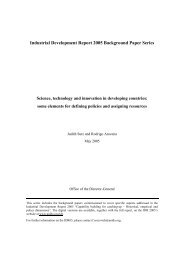Manual on the Development of Cleaner Production Policies ... - Unido
Manual on the Development of Cleaner Production Policies ... - Unido
Manual on the Development of Cleaner Production Policies ... - Unido
Create successful ePaper yourself
Turn your PDF publications into a flip-book with our unique Google optimized e-Paper software.
DEVELOPMENT OF CP POLICY<br />
MODULE 3: CP POLICY DEVELOPMENT CYCLE<br />
specialized instituti<strong>on</strong>s (e.g. <strong>the</strong> Envir<strong>on</strong>mental Inspectorate, <strong>the</strong> Envir<strong>on</strong>mental Protecti<strong>on</strong> Agency,<br />
<strong>the</strong> Envir<strong>on</strong>ment Impact Assessments Office), <strong>the</strong>ir participati<strong>on</strong> and views would be valuable. A<br />
pers<strong>on</strong> with a legal background and familiarity with <strong>the</strong> policy-making process would be a great asset.<br />
Last but not least, it could be useful to include a representative <strong>of</strong> envir<strong>on</strong>mental service providers, to<br />
provide <strong>the</strong> perspective <strong>of</strong> <strong>the</strong> envir<strong>on</strong>mental c<strong>on</strong>sultants.<br />
Once <strong>the</strong> group is formed, it is recommended that it clearly define at <strong>the</strong> outset <strong>the</strong> functi<strong>on</strong>s and<br />
objectives <strong>of</strong> <strong>the</strong> group and <strong>the</strong> mechanism for coordinating its work. General objectives should be<br />
discussed and agreed up<strong>on</strong>, such as: “To prepare within twelve m<strong>on</strong>ths a draft nati<strong>on</strong>al CP policy for<br />
approval by <strong>the</strong> Government”; or, “Integrate CP into <strong>the</strong> industrial development policy”. At <strong>the</strong> close<br />
<strong>of</strong> each meeting, it may be good practice to draw up <strong>the</strong> agenda for <strong>the</strong> next meeting, and to agree <strong>on</strong><br />
its date and place. If participants have different backgrounds and little experience in CP or <strong>the</strong><br />
envir<strong>on</strong>ment, it might be useful to provide some capacity-building <strong>on</strong> CP and policy tools.<br />
Practice shows that most <strong>of</strong> <strong>the</strong> work in <strong>the</strong> initial stage <strong>of</strong> policy development is d<strong>on</strong>e by <strong>the</strong> CP<br />
Centre and <strong>the</strong> hired experts. Some CP Centres have organized this stage <strong>of</strong> <strong>the</strong>ir work as a separate<br />
project, permitting <strong>the</strong>m to hire experts <strong>on</strong> sectoral policies where needed. Expertise <strong>on</strong> policy<br />
development and analysis, sectoral policies, and law and policy instruments have all proven<br />
particularly useful. CP Centres are also in a positi<strong>on</strong> to involve all stakeholders and can take<br />
resp<strong>on</strong>sibility for a number <strong>of</strong> logistic, training, informati<strong>on</strong> and secretarial functi<strong>on</strong>s.<br />
It may not be realistic to rely initially <strong>on</strong> <strong>the</strong> Government to lead <strong>the</strong> process. In fact, <strong>the</strong> str<strong>on</strong>g<br />
interventi<strong>on</strong> <strong>of</strong> <strong>the</strong> Government might actively discourage <strong>the</strong> voluntary participati<strong>on</strong> <strong>of</strong> some sectors.<br />
However, it is essential that <strong>on</strong>e entity accepts resp<strong>on</strong>sibility to act as coordinator to encourage <strong>the</strong><br />
many stakeholders to carry out <strong>the</strong>ir roles and to help foster cooperati<strong>on</strong> am<strong>on</strong>g parties with<br />
occasi<strong>on</strong>ally c<strong>on</strong>flicting agendas.<br />
As menti<strong>on</strong>ed earlier, <strong>the</strong> key point in <strong>the</strong> compositi<strong>on</strong> <strong>of</strong> <strong>the</strong> technical group is to gain access to those<br />
pers<strong>on</strong>s within stakeholder instituti<strong>on</strong>s who have <strong>the</strong> power to make decisi<strong>on</strong>s. It is unlikely that a<br />
deputy minister or a department director will participate in pers<strong>on</strong> in <strong>the</strong> work (instead, <strong>the</strong>y should be<br />
members <strong>of</strong> <strong>the</strong> Steering Committee), but it is also counterproductive to expect a meaningful<br />
c<strong>on</strong>tributi<strong>on</strong> from a junior specialist hired fresh out <strong>of</strong> college. This is why <strong>the</strong> proposal was made for<br />
a Steering Committee and a separate technical working group. Never<strong>the</strong>less, it is essential to maintain<br />
communicati<strong>on</strong> between <strong>the</strong> technical policy working group and decisi<strong>on</strong> makers in <strong>the</strong> Steering<br />
Committee.<br />
It is important to give recogniti<strong>on</strong> to excellent performance and genuine effort <strong>on</strong> <strong>the</strong> part <strong>of</strong><br />
participants. A well deserved verbal compliment or a short memo to a superior with words <strong>of</strong> praise<br />
for his or her representative (and perhaps an update <strong>on</strong> <strong>the</strong> progress <strong>of</strong> CP policy development) would<br />
be useful.<br />
PAGE 60
















